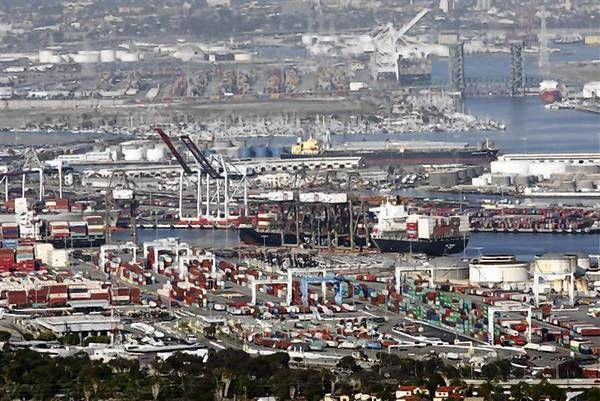Calif Port Strike Enters Day 4, Cost Estimated At $1B/Day

A strike by about 800 clerical workers at California's Los Angeles/Long Beach port complex entered its fourth day Friday and left only a handful of berths functional with financial damages going into the billions of dollars.
The strikers, who began their job action Tuesday, are members of the office clerical unit of the International Longshore and Warehouse Union who say they’re protesting the gradual outsourcing of their jobs. Longshore workers who are members of the union have refused to cross the picket line, saying they support the clerical workers who have worked for 30 months without contracts.
A spokesman for the shipping lines and cargo terminals against which the clerks are striking said it had offered them "absolute job security," a raise that would take average annual pay to $195,000 from $165,000, 11 weeks of paid vacation and a generous pension increase, according to the Los Angeles Times.
The Los Angeles/Long Beach Harbor Employers Association, which represents the companies, say that the union is pressuring them to hire more workers than it needs, a practice known as "feather bedding."
Talks between the two groups resumed Thursday evening.
The port complex handled about 40 percent of the nation’s cargo container traffic from an average of about 19 container ships a day last year. It employs roughly 10,000 dock workers plus a much larger number of truckers and trading company employees that depend on the port complex. Only four of the 14 terminals that make up the LA/Long Beach complex are operating.
The strike is getting expensive. Container ships are being re-routed to other U.S. West Coast facilities and Mexico and trucks stand idle in long lines waiting to receive the goods from Asia during the busiest shopping season of the year. The cost is estimated to be about $1 billion per day. The longer port traffic is interrupted, the wider the logistical effect as merchants will be unable to restock Asian-made goods, and once the flow starts up again it could take days to get the flow back to normal.
“A prolonged strike at the nation’s largest ports would have a devastating impact on the U.S. economy,” warned National Retail Federation President and CEO Matthew Shay, head of the country’s largest retail industry advocacy group.
The Retail Industry Leaders Association has asked U.S. President Barack Obama to invoke the Taft-Hartley Act – which allows the executive branch to intervene to stop strikes affecting vital parts of the U.S. economy – if necessary to get cargo flow up and running again at the complex. U.S. President George W. Bush invoked the act against the same union orchestrating the current work stoppage, the International Longshore and Warehouse Union (ILWU).
“It’s a logistics nightmare,” John C. Martin, an economist at Martin Associates in Lancaster, Pennsylvania, told Bloomberg. “The problems mount exponentially the longer this goes on.”
Meanwhile, Los Angeles Mayor Antonio Villaraigosa is publicly urging the two negotiating sides – the union and the Los Angeles/Long Beach Harbor Employers Association – to come to an agreement.
© Copyright IBTimes 2024. All rights reserved.
Join the Discussion





















